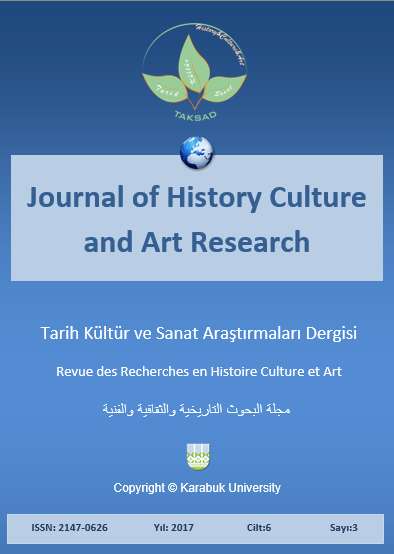Communicative Interaction among Local Editorial Staff Members: Current Situation and the Ways of its Improving
DOI:
https://doi.org/10.7596/taksad.v6i3.1018Keywords:
Organizational communication, media organization, internal communication, external communication, journalism.Abstract
Communication between management and employees is very important in organizations. However, communication problems might be more felt in any media organization as a whole and in the local media staff in particular. It’s obvious that news workers have everyday communicative interaction with different newsmakers. The article deals with the study and analysis of the communicative interaction between the local editorial creative staff members. Internal and external organizational understanding data are considered. It is determined that the level of organizational communication development influences the local editorial success and employees’ performance. Mutual understanding as the basic criterion of effective communication has several forms. The subject of our study is organizational understanding, that is, a special type of editorial staff relationship which is limited by the boundaries of the organization and is essential for its successful functioning and development. The analysis of empirical data allowed to identify the main problematic aspects and to work out the recommendations for vertical and horizontal communication development.
References
Danakin, N. S.; Konev, I. V., & Korotickaja, M. V. (2007). Kommunikativnaja tehnologija [Communicative Technology]. Belgorod: BGTU: 168. (in Russian)
Dzagurova, A. F. (2014). Professii sovremennoj mediasredy [Professions of Modern Media Sphere]. Aktual'nye problemy medaissledovanij-2014. Moscow: Fakul'tet zhurnalistiki MGU im. M.V. Lomonosova. 29-33. (in Russian)
Gasparjan, B. P., & Nemchina, V. I. (2000). Strategii formirovanija innovacionnyh upravlencheskij kommunikacij [Strategy Building Process of Innovative Management Communication]. Vestnik akademii. Rostovskaja jekonomicheskaja akademija. 1: 41-50. (in Russian)
Hargie, O.; Tourish, D., & Wilson, N. (2002). Communication audits and the effects of increased information: A follow-up study. The Journal of Business Communication http://www.academia.edu/28645174/Communication_Audits_and_the_Effects_of_Increased_Information_A_Follow-up_Study.
Karpov, A. V. (2005). Psihologija menedzhmenta [Philosophy of Management]. Moscow: Gardariki. 584. (in Russian)
Kazak, M. Ju. (2008). Monitoring sovremennogo sostojanija regional'noj pressy Belgorodskoj oblasti [Monitoring of Modern Regional Press of Belgorod Region] Vestnik Voronezhskogo gosudarstvennogo universiteta. Filologija. Zhurnalistika. 1: 186-195. (in Russian)
Kolomiets, V. P. (2014). Sociologicheskie issledovanija massovyh kommunikacij v Rossii [Sociological Studies of Mass Media in Russia]. Aktual'nye problemy medaissledovanij-2014. Moscow: Fakul'tet zhurnalistiki MGU im. M.V. Lomonosova. 75-79. (in Russian)
Kozhemyakin, E. A. (2012). Social'no-jepistemologicheskie harakteristiki medijnyh diskursov [Social epistemological Features of media Discourses]. Nauchnye vedomosti BelGU. Gumanitarnye nauki. 18 (137): 134-139. (in Russian)
Krutin, A. B., & Gorbunkov, M. A. (1996). Biznes-kommunikacija v social'nyh sistemah [Business Communication in Social Systems]. Sociologicheskie issledovanija. 10: 118-126. (in Russian)
Kvjat, A. G. (2014). Gorodskie kommunikativnye issledovanija: novoe napravlenie na styke urbanistiki i kommunikativistiki [City Communicative Studies: New Ways at the Turn of Urban and Communication Studies]. Aktual'nye problemy medaissledovanij-2014. Moscow: Fakul'tet zhurnalistiki MGU im. M.V. Lomonosova. 70-72. (in Russian)
Leshchenko, T., Sokolova, I., & Teplova, L. (2016). The Inevitability of The Alienation of Communication in the Era of Globalisation. Economic and Social Development 16th International Scientific Conference on Economic and Social Development. Croatia. 735-761.
Panfilova, A. P. (2001). Delovaja kommunikacija v professional'noj dejatel'nosti [Business Communication in Professional Activity]. Saint-Petersburg: Znanie: 496. (in Russian)
Proctor, C. (2014). Effective Organizational Communication Affects Employee Attitude, Happiness, and Job Satisfaction. A Thesis submitted to Southern Utah University In partial fulfillment of the requirements for the degree of Master of Arts Professional Communication. 74.
Ramirez Lopez, D. (2012). Organizational Communication Satisfaction and Job Satisfaction within University Foodservice. A thesis for the degree Master of Science. Kansas State University Manhattan, Kansas. 114.
Savinova, O. N. (2014). Zhurnalistskaja professija v sovremennom transformirujushhemsja mire [Journalism in Modern Transforming World] Aktual'nye problemy medaissledovanij-2014. Moscow: Fakul'tet zhurnalistiki MGU im. M.V. Lomonosova. 114-118. (in Russian)
Snetkov, V. M. (2002). Psihologija kommunikacii v organizacijah [Communicative Psychology in Organizations]. Moscow: Institut Obshchegumanitarnyh Issledovanij. (in Russian)
Zankovskij, A. V. (2002). Organizacionnaja psihologija [Organizational Psycology]. Moscow: Flinta: MPSI. (in Russian)
Downloads
How to Cite
Issue
Section
License
All papers licensed under Creative Commons 4.0 CC-BY.- Share — copy and redistribute the material in any medium or format
- Adapt — remix, transform, and build upon the material for any purpose, even commercially.
Under the following terms:
Attribution — You must give appropriate credit, provide a link to the license, and indicate if changes were made. You may do so in any reasonable manner, but not in any way that suggests the licensor endorses you or your use.
- No additional restrictions — You may not apply legal terms or technological measures that legally restrict others from doing anything the license permits.







